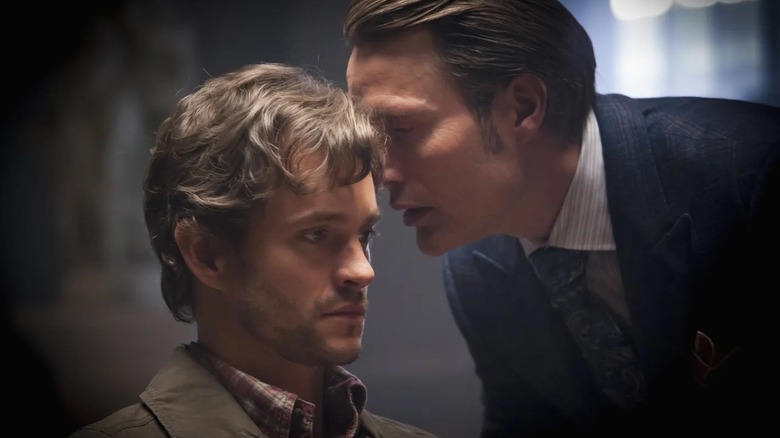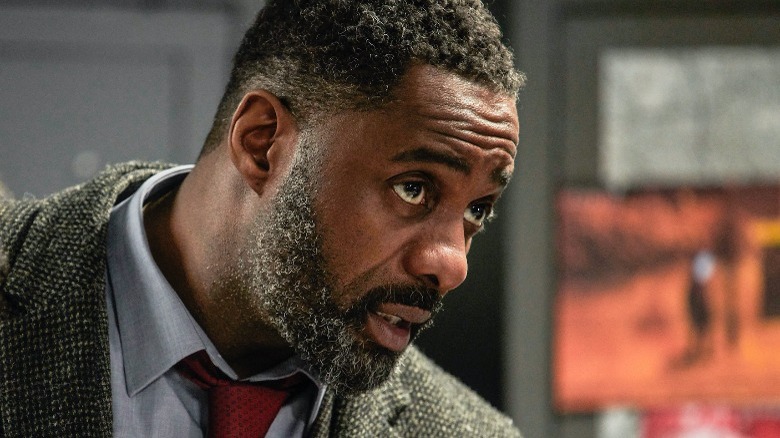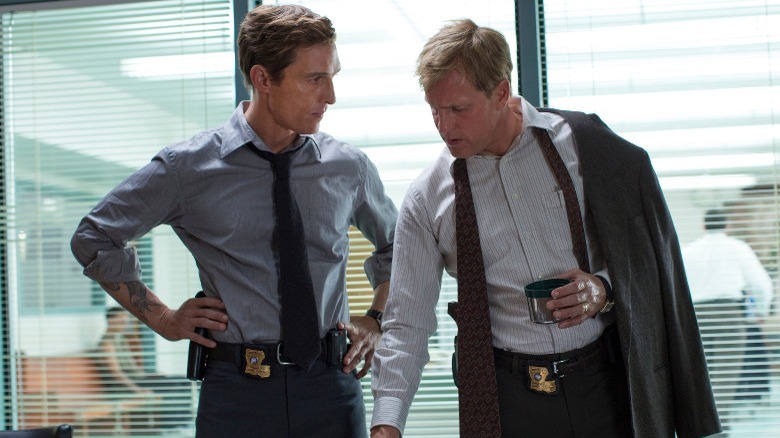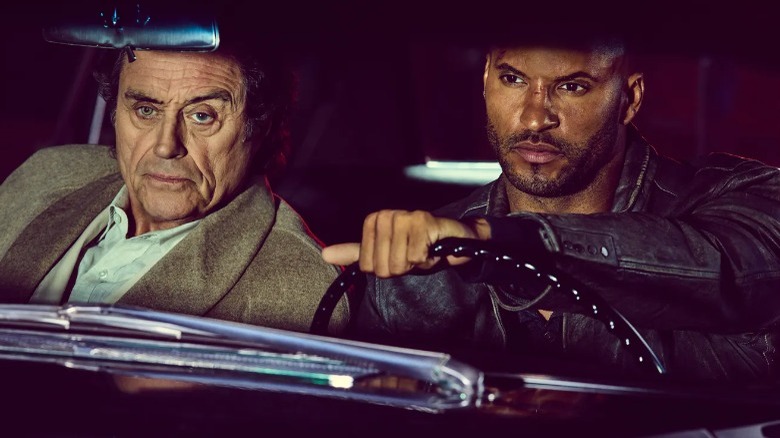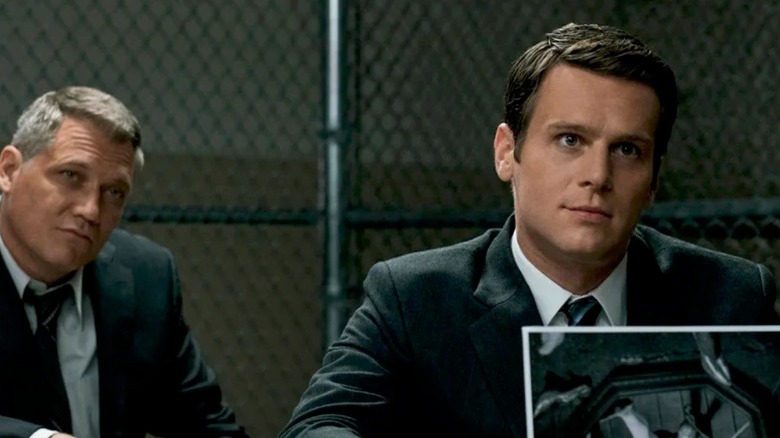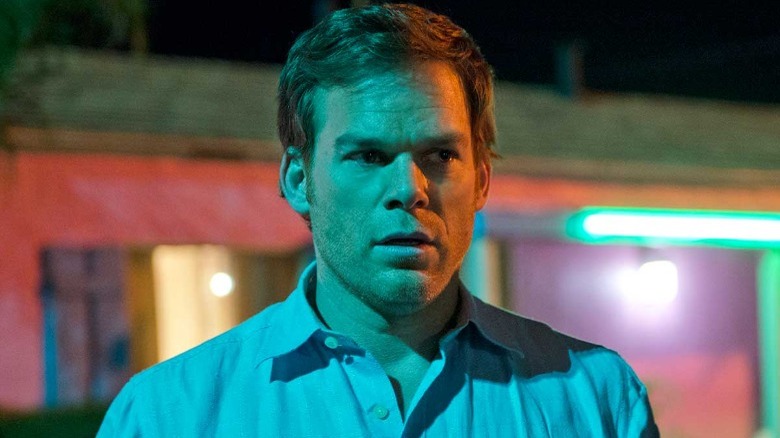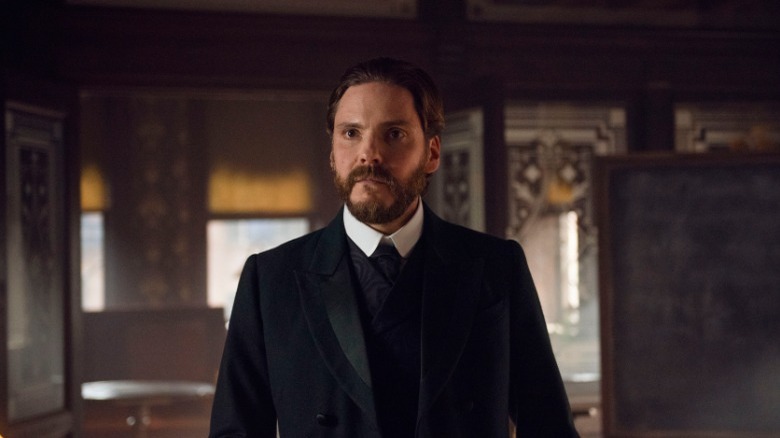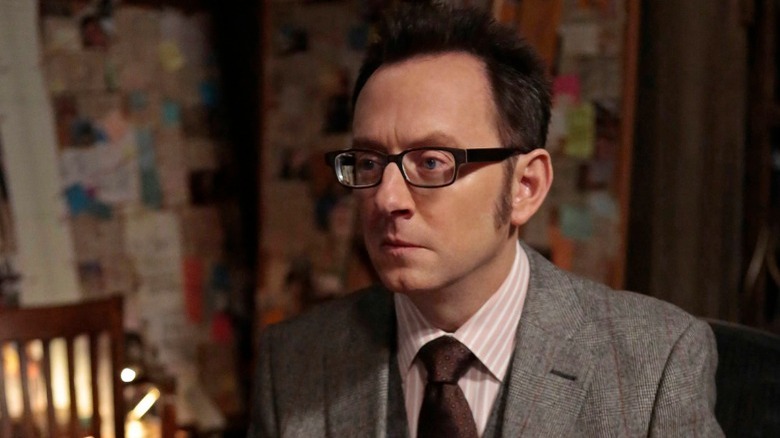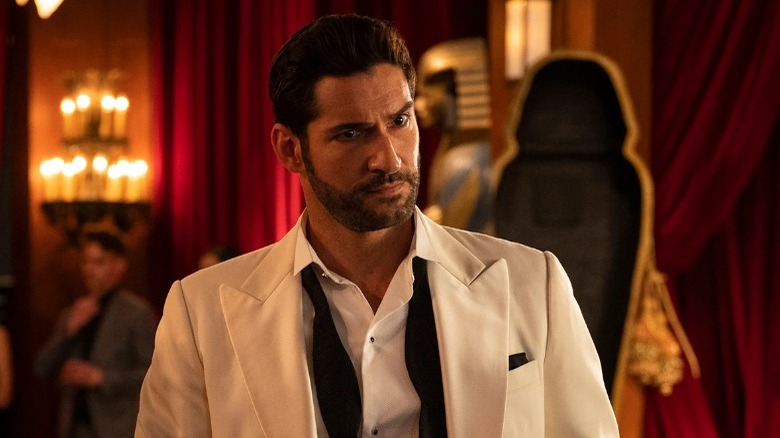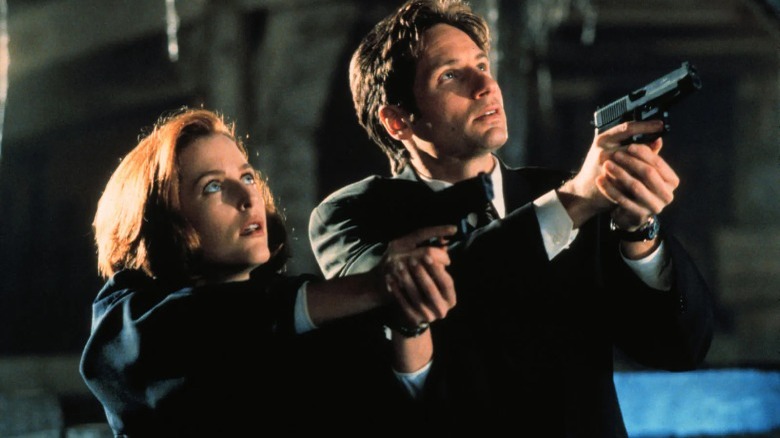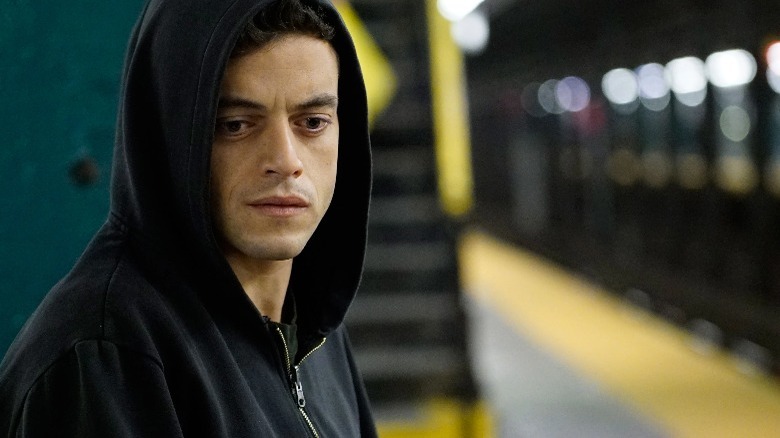12 Shows Like Hannibal That Will Get Your Blood Pumping
Bryan Fuller's style is difficult to replicate. Full of detail, sometimes muted by shadows or vibrant with gore, it's easy to recognize his signature on earlier creations such as "Pushing Daisies" and "Dead Like Me." "Hannibal" has resonated the strongest with his fans, though. Hannifans are a testament to the power of fandom, keeping this three-season series alive — with the hope of a continuation — via new art, fanfiction, and recreating Hannibal's cuisine with the help of the series' food consultant Janice Poon ... without Lecter's most unique, uh, ingredients.
Sumptuous and elegant (are we talking about the show or Mads Mikkelson as Dr. Hannibal Lecter?), Fuller's creation believes in the intelligence of its viewers, never holding back the details of a damaged mind. Lecter's psychology is the most intriguing, often kept locked tight, but Will Graham (Hugh Dancy) is the key to unraveling pieces of him. That requires an intimate relationship that courts the taboo of a hunter loving his prey. It's a dynamic with an irresistible lure. While "Hannibal" can't be replicated, there are two ways to celebrate it: Help the fans keep the dream of more "Hannibal" alive, and dive into any one of these 12 shows to at least sate your appetite temporarily.
Luther (2010-2019)
No matter where your first introduction to Idris Elba took place, it has high odds of being unforgettable. While Americans probably first met Stringer Bell in "The Wire," our friends across the pond got DCI John Luther. BBC's "Luther" isn't just his story, it's also the story of Alice Morgan, the killer he can't quite catch, and he's increasingly uncertain that he wants to. It's a familiar kind of taboo for "Hannibal" fans, but Luther's not much like the introspective Will Graham.
Luther is a brutalist, an old-time cop with the ability to see a crime scene almost as well as Graham does, but with too much anger in his heart for the perpetrators. It's a searing look at the mindset of men who actually do what "tough guys" claim they would in their shoes: hurt a criminal, terrorize informants, and worse. The results are also as clear. Luther loses friends and allies by the bushel doing it his way, to the point his stalker friend, Morgan, becomes a too-familiar presence. It's ugly stuff, but as irresistible as an invitation to one of Hannibal Lecter's friendly luncheons.
True Detective (2014-present)
Skip the second season of the anthology series "True Detective," it lacks the intriguing personal inveiglements we want. Seasons 1 and 3, however, ride to victory on the backs of their duet dynamics. The first gives us Rust Cohle (Matthew McConaughey) and Marty Hart (Woody Harrellson) with a chiller of a tale. The story of the dead and lost of Louisiana is seen mostly through Cohle's eyes, who looks at the world with apocalyptic sensibilities. He doesn't guide the viewer with Will Graham's nightmare stag, but with a spiraling nihilism that lured the audience into seeing the world as if everything around us is a cosmic horror story.
Season 3 gives us Wayne Hays (Mahershala Ali) and Roland West (Stephen Dorff), two cops from very different worlds and a cold case strung across decades. This one, however, pits Hays against himself in as dreamlike a web as a "Hannibal" fan could want. This one is bittersweet, though, because the later Hays has elder dementia and not all of his memories have lasted. Dorff is a terrific platform for Ali to work off of, and their conversations are a smart and earthy delight for "Hannibal" viewers.
American Gods (2017-2021)
Hard to pass up another Bryan Fuller creation when looking for that gourmand fix. The magic of "American Gods" begins to dwindle fast in its other two seasons, but the first is still a treat to experience. Author Neil Gaiman signed on as producer, helping Fuller nail eight episodes of dreamlike wandering through old gods trying to survive in a world that no longer needs them. Do at least stick through the second season premiere, "The House on the Rock," which may be your first introduction to one of the world's wildest real-life tourist traps.
The first season doles out some excellent moments, as vivid as "Hannibal" and loaded with symbols to ponder. The god Vulcan finds his way to new power through modern militias, while the Slavic gods suffer in forgotten poverty. A goddess of spring co-opts Christian ritual, while a much more realistic Jesus suffers another crucifixion alongside his first disciples, the wandering and the lost looking for a way. It's brilliant stuff, and it's a shame that — like "Hannibal" — Fuller couldn't see it through. At least fans of Hannibal Lecter and Will Graham can still hold out hope.
Mindhunter (2017-2019)
In 1995, retired FBI agent John E. Douglas released one of the best non-fiction looks inside the career of a criminal profiler, "Mindhunter: Inside the FBI's Elite Serial Crime Unit." Douglas' work became the basis for a number of profilers in popular fiction, and that includes Will Graham. Author Thomas Harris attended one of Douglas' early public presentations, learning about some of the real killers that formed the basis of Hannibal Lecter's urbane criminality.
The Netflix adaptation from series creator Joe Penhall titled "Mindhunter" goes back to the plain horror of it all. Using Douglas' book as a baseline, this fiction series is set in the late '70s and recreates Douglas' interviews with serial predators, interwoven with new characters and a look at what was then a fresh field in criminology. It's tough stuff, with producer David Fincher lending his trademark grim and grimy tone to the series. For fans that might've come to "Hannibal" fairly fresh from its sci-fi tonal predecessor "Fringe," Anna Torv's presence is an extra gift. Currently on a long — possibly permanent hiatus — there's still plenty here for hungry fans to devour.
Dexter (2006-2013, 2021-2022)
The original ending to "Dexter" is so bad that, frequently, that may be the only thing people know about it. There are two bits of good news: One, much of the series is still a terrific thriller with one of the worst yet most fascinating fictional baddies on Earth at its heart, and two, the ten-years-later miniseries "Dexter: New Blood" eases the big screw-up. Or maybe makes it worse in its own finale? They sure did try their best, either way, and it's all compelling stuff.
"Hannibal" fans are used to being left hanging, so long as the rest of the ride is worthwhile. Dexter is Hannibal Lecter and Will Graham all in one. He works for the justice system as a forensics guy, and he's also a serial killer with a strict code and methodology ... usually. Sold to the audience as a "pure sociopath," Dexter is actually a psychopath with some unusual affection for his family. None of this detracts from making him fascinating to watch, even as the show wrestles with reminding us that he's supposed to be the villain here. It's not as sure in its horror as "Hannibal," but it's still a great companion classic.
The Alienist (2018-2020)
Let's go back to the roots of modern psychology. It's the late 1800s, and a practitioner of this fledgling field is still called an alienist. Borrowed from the French noun aliéné, meaning an insane person, the alienists at this time often became our earliest criminal profilers. Caleb Carr's "The Alienist," adapted for TNT in 2018, follows the fictional Dr. Lazlo Kriezler (Daniel Brühl) as he assists Teddy Roosevelt — yeah, that one, played here by Brian Geraghty — in solving a gruesome crime spree. It is not a pleasant situation.
Less dry than you'd fear, "The Alienist" has no problem delving into the hedonism of New York City at the turn of a century. While not as lush as Hannibal Lecter's dinner table, the richness on display in contrast to brutal class struggles adds poignancy to a bloody costume drama. It's not hard to empathize with these characters even when they're trying to feel distant, and Brühl is always a stellar actor to watch. For those fascinated by the details of Will Graham's job, "The Alienist" remains a fine starter watch.
Person of Interest (2011-2016)
Michael Emerson will always be Ben Linus to some of us, but he puts that same intensity into someone we can root for in "Person of Interest." Harold Finch isn't the real name of Emerson's quirky hero, and he consistently tries to act like someone we can't trust, but he's the heart of a series that goes in-depth on the morals and ethics behind both Philip K. Dick's "The Minority Report" and the dangers of nascent AI, and he's forever a joy to watch.
On the other hand, Jim Caviezel as John Reese (nice "Terminator" reference) is a generally present ex-military dude with the requisite CIA training. He's the muscle to Finch's brains, an honor-bound duty hound who could have been played by anyone and probably should have been. Yet his generic addition doesn't draw much away from the neat light-SF plot running through "Person of Interest." Emerson aptly carries the series' various character dynamics with enough flair that we'd kill to watch him play off of Mads Mikkelson for an hour, eccentric to eccentric. (Psst: Try "Evil," too, for more Emerson goodness)
Lucifer (2016-2021)
It probably wouldn't take much to get "Hannigram" fans to admit they'd bang a hot Satan given a chance. For all your fantasy needs, here's Tom Ellis charming his way through a luscious version of the former King of Hell. "Lucifer" is technically a DC series, and — to borrow MCU terminology — Ellis' Lucifer is a variant of the same Lucifer we met in "The Sandman," complete with the loyal demon Mazikeen at his side.
The similarities end — mild spoiler for future "Sandman" arcs ahead — with the name of the nightclub Lucifer runs. Lux is his turf as the series opens, as luxurious and debauched as Hannibal Lecter could want. The Devil always throws the best parties, but being a decent person? That's a switch-up. Only God could have guessed that this fallen angel would decide to become a police consultant for kicks, and maybe They did. Certainly, these questions become a plot point in the bizarre but delightful later seasons. For its charm, its absolute commitment to its wild presence, and Ellis' note-perfect performance, "Lucifer" is a perfectly pleasant accompaniment to "Hannibal."
The X-Files (1993–2002, 2016-2018)
"The X-Files" isn't just a classic, it's the modern OG for fans of that push-and-pull dynamic that ties Will Graham and Hannibal Lecter together. Fox Mulder (David Duchovny) is enthusiastic, hopeful, and (quietly) a little hedonistic. Dana Scully (Gillian Anderson, decades before she would become Hannibal Lecter's, um, friend) is cool, calculated, and starts off fairly distanced. Together they hunt aliens. And cryptid serial killers. And Eugene Victor Tooms (Doug Hutchison), which is one of those pieces of trivia we look back on and think "yeah."
This show thrives on the charisma between Mulder and Scully, a pull so strong that — for better and for worse — puts the series' central arc on a collision course with their growing relationship. The equally recommended spin-off series "Millennium" surrounds its lead, retired FBI profiler Frank Black (Lance Henriksen), with a cold void he's just as enthralled with at first. Both stumble towards the end, with "Millennium" in particular getting an abrupt sort-of-finale in a crossover episode with "The X-Files," but the atmosphere of these shows still can't be beaten.
I'll Be Gone in the Dark (2020-2021)
Michelle McNamara's life isn't a cautionary tale, but there are lessons to take away from her story. She was a true crime devotee whose persistence in solving the riddle of the Golden State Killer helped revive the cold case in popular culture, and the culprit would be finally arrested after her book was published. The cost was her own life. Her husband, Patton Oswalt, would later acknowledge the opioid addiction that helped Michelle cope with the horrors she chronicled, and how it all killed her.
The HBO miniseries based on her book "I'll Be Gone in the Dark" blends documentary with drama, and like David Fincher's "Zodiac" it treads the line between fascination and losing ourselves to the deep waters. It's a warning fans of Will Graham should heed. "Hannibal" is fun stuff, but there's an edge of reality we need to be aware of when playing with our bloodiest toys. This brief-but-taut miniseries is the perfect palate cleanser before returning to Hannibal Lecter's table.
Killing Eve (2018-2022)
Like "Dexter," a lot of ink was spilled breaking down the ending of "Killing Eve." Overall, it's a fair opinion that the show didn't quite stick to the landing, but the ride is well worth it despite its flaws. With Jodie Comer as Villanelle and Sandra Oh as the titular Eve, this series about lust and taboo is ... well, it's basically the beating, bloody heart of "Hannibal" with a different cast. It's not just a gender swap, though. The changed dynamic opens up new perspectives on sexuality, using fashion to tell a story as well as the general taboos women still face.
Eve is openly obsessed with female assassins, which is fair in a world of Black Widows and Red Sparrows. However, Villanelle isn't a pet to be studied, she's a weapon with a mind of her own. All that saves Eve is a mutual fascination, more powerful than either MI5 or the mysterious organization that gives Villanelle her killing orders. At least "Killing Eve" does have a proper ending. Not that we're bitter about the limbo "Hannibal" is still stuck in, or anything.
Mr. Robot (2015-2019)
It may not lean into the horrors of the human mind the way "Hannibal" fans expect, but like "Person of Interest" there's enough character intricacy in "Mr. Robot" to satisfy fans looking for rich dynamics between troubled people. Instead of criminal profiling, Elliot Alderson (Rami Malek) is a neurodivergent cybersecurity expert who finds himself lured into a society of hacktivists dedicated to making the world a better place. At least, that's what Elliot thinks is what's going on as the series opens.
If you don't know any spoilers for "Mr. Robot," keep it that way. If you need one hook to catch your intrigue, consider that series creator Sam Esmail is open about his inspirations for the biggest twists and turns, and they include head-spinning movies like "Fight Club." More than anything else, it's a show that (like "Hannibal") believes in its audience. Attention to detail is necessary to enjoy the series, and you'll come out a little bit better informed about cybersecurity, which the show handles with actual expertise. Best of all, it's four tightly-paced seasons long, with a finale that pays off rich dividends in its last minutes. That's a treasure all "Hannibal" fans can still strive for.
